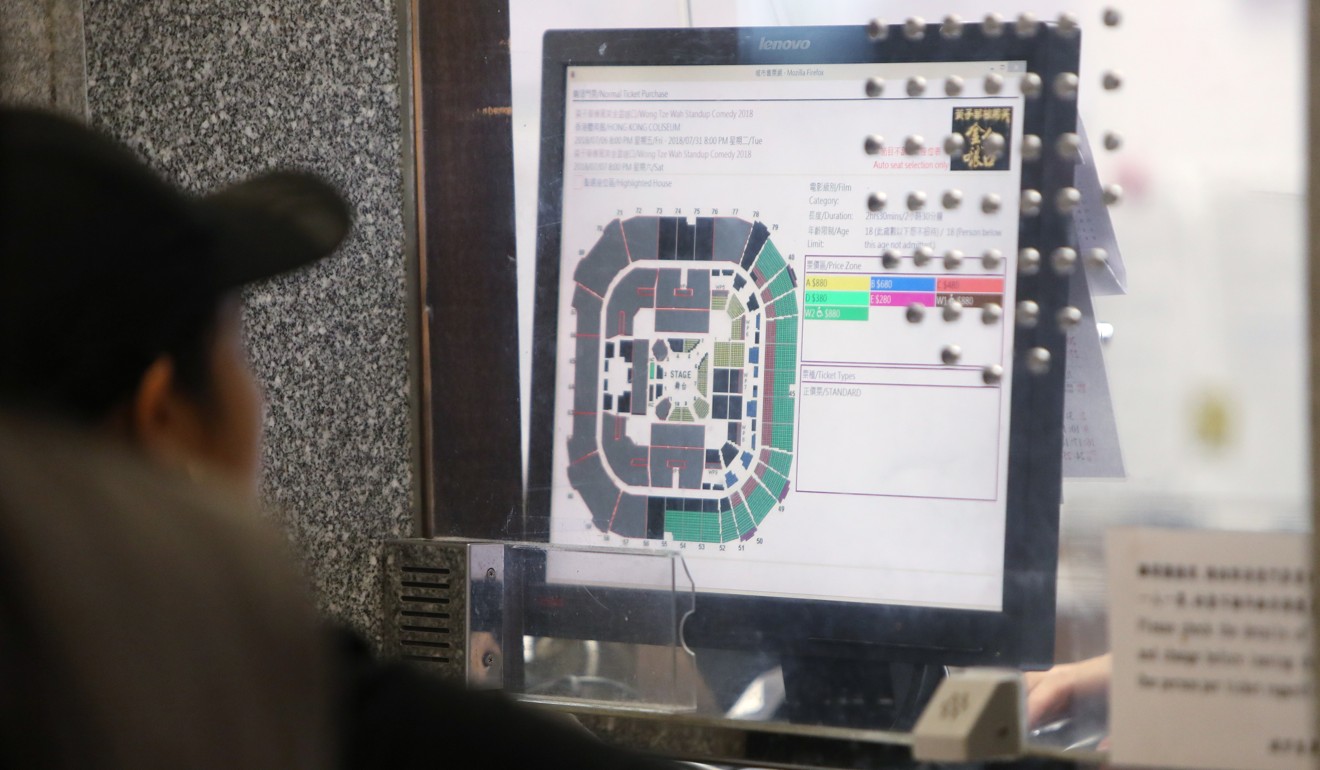
Hong Kong fan’s HK$40,000 bill for a HK$1,000 Andy Lau ticket fuels consumer watchdog’s call for scalping to be made illegal across all venues in city
Consumer Council backs calls for legal loophole to be closed and criticises websites Viagogo, StubHub and Ticketbuynow for fuelling ‘illusion of hot demand’
Hong Kong’s consumer watchdog has backed calls to revise scalping laws and plug a loophole that enables tickets to be resold online at massively inflated prices, with little to no customer protection.
In one extreme case cited by the Consumer Council, an eager fan paid HK$40,000 (US$5,000) for a HK$1,000 ticket on a second-hand resale website to see Canto-pop legend Andy Lau Tak-wah perform this winter.
The watchdog analysed the business practices of three ticket resale platforms operating in Hong Kong – Stubhub, Ticketbuynow and Viagogo.

“Prices of tickets through such platforms were invariably jacked up by a few people to dozens of times their original prices,” it said on Monday.
“Buying from ticket reselling platforms will only serve to fuel speculation on already inflated prices of big-ticket events, and consumers should be discouraged from [making] such transactions.”
Tactics used to fuel “the illusion of hot demand” included setting countdown timers to pressure consumers to speed up purchases, making claims that limited tickets remained, or telling people how many had “just bought tickets for this event”.
“This forces the consumer into a hasty purchase decision,” the watchdog added.
Australia’s competition and consumer commission took similar platforms to court last year on grounds that such practices were tantamount to “false and misleading trade practices”.
And in August, Britain’s Competition and Markets Authority announced it was taking Viagogo to the High Court over concerns it was breaking consumer protection law.
Ticket scalping in Hong Kong is just business and should not be overly regulated
The council pointed out that, in addition to inflated prices, the platforms extracted hefty booking and handling fees from both seller and buyers, adding substantially to the cost of a ticket.
The council said price profiteering was no different from ticket scalping.
Ticketbuynow pocketed 15 per cent from buyers, while StubHub and Viagogo charged 16.5 and 28.8 per cent. The three platforms extracted 10 to 18 per cent from sellers. This meant handling fees could account for anywhere from 26 to 39 per cent of original ticket price, the council said.
And, the council said, the exorbitant prices were “disproportionate to the level of service that these platforms should rightly provide”.
Customer service was “virtually non-existent” in some cases, and the fact that many of these platforms were based overseas made it difficult for consumers to seek redress, refunds or queries.
Counter ticket sales suspended for Andy Lau concert after four arrested over knife attack on mainland Chinese man in queue
“The council is calling for a review and revision of the existing legislation by the authorities concerned with removing the grey area in the law, for the benefit of consumers,” said the council’s Clement Chan Kam-wing.
He warned that the Trade Descriptions Ordinance could not guarantee a consumer any protection because sellers were touting them as individuals, not as traders.
Ticket scalping is illegal at private entertainment venues in Hong Kong, but premises managed by the Leisure and Cultural Services Department, such as the Coliseum, where Lau is performing, are exempted.
The watchdog suggested extending the scalping laws to government premises, raising penalties for scalping – now set at just HK$2,000 for each offence – requiring ticket purchases to be matched to the buyer’s name, and for organisers to allocate more tickets for public sale.
Touts snap up tickets as fans queue overnight for chance to see Dayo Wong
The Home Affairs Bureau said the department had already implemented several measures to ensure tickets were sold in a fair and orderly manner through formal channels.
Following a string of high-profile ticket scalping incidents earlier this year, Chief Executive Carrie Lam Cheng Yuet-ngor pledged to look into raising the penalty for ticket scalping, and extending related regulations to cover all government premises.
The Consumer Council has received 306 complaints related to “public performances” up to September this year, more than 10 times that for the same period last year.
The Performing Industry Association joined the calls for specific and stringent scalping laws for both online second-hand ticketing platforms and ticket resales near public performing premises.
“Without these legal moves, members of the public might mistakenly believe that scalping is not against the law, and scalpers will be encouraged,” the association said in a statement.
Viagogo said it did not set ticket prices, and all transactions were between buyers and sellers, and based on supply and demand. For the same reason, it did not provide refunds – purchasers can “simply resell them to another buyer” on the platform.
Viagogo is run by American Eric Baker, who founded StubHub with university classmate Jeff Fluhr, and has an office in London. The pair sold StubHub to eBay in 2007 for $304 million.
StubHub and Ticketbuynow could not be reached for comment on Monday.

